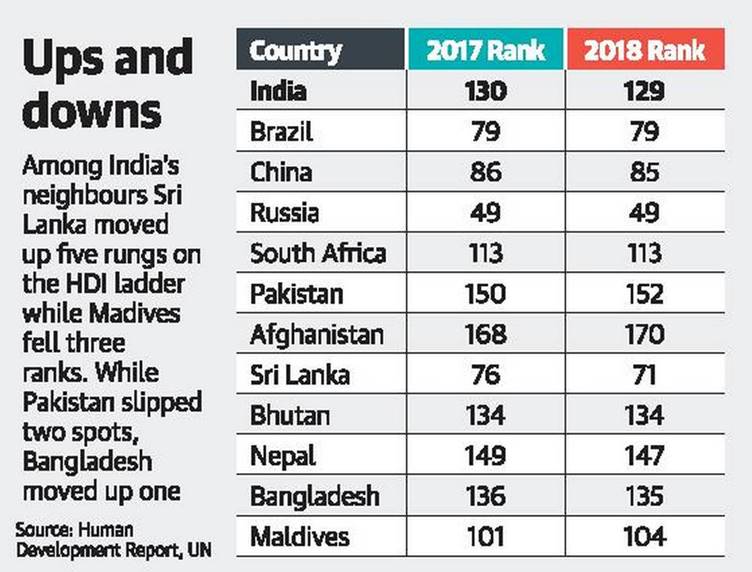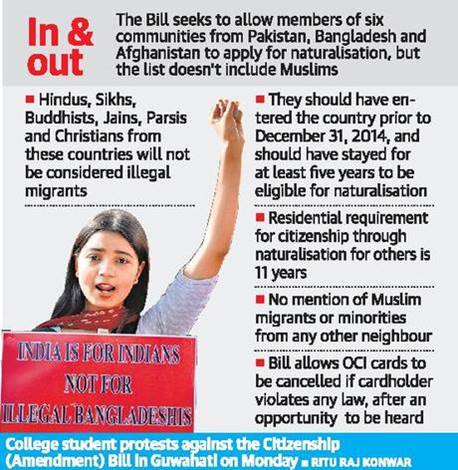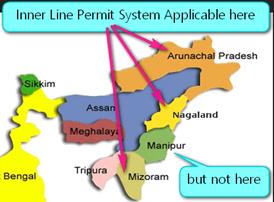



India up one rank in UN development index

- India ranks 129 out of 189 countries on the 2019 Human Development Index (HDI) — up one slot from the 130th position last year.
- Norway, Switzerland and Ireland occupied the top three positions in that order.
- South Asia was the fastest growing region in human development progress witnessing a 46% growth over 1990-2018.
- India’s HDI value increased by 50% (from 0.431 to 0.647), which places it above the average for other South Asian countries (0.642).
- For inequality-adjusted HDI (IHDI), India’s position drops by one position to 130, losing nearly half the progress (.647 to .477) made in the past 30 years.
- Group-based inequalities persist, especially affecting women and girls and no place in the world has gender equality.
- In the Gender Inequality Index (GII), India is at 122 out of 162 countries.
- World is not on track to achieve gender equality by 2030 as per the UN’s Sustainable Development Goals.
- It presents a new index indicating how prejudices and social beliefs obstruct gender equality.
- It shows that only 14% of women and 10% of men worldwide have no gender bias.
- These biases have shown a growth especially in areas where more power is involved.
- New forms of inequalities will manifest in future through climate change and technological transformation.
According to the UNDP, HDI is “a summary measure of average achievement in key dimensions of human development: a long and healthy life, being knowledgeable and have a decent standard of living”.
- Health – Life expectancy at birth
- Education – Expected years schooling for school-age children and average years of schooling in the adult population
- Income – Measured by Gross National Income (GNI) per capita (PPP US$)
The Gender Inequality Index (GII) is an index for measurement of gender disparity that was introduced in the 2010 Human Development Report
- Reproductive Health
- Empowerment
- Labour Market Participation
A Bill seeking to extend by 10 years reservation to the Scheduled Castes and Scheduled Tribes in the Lok Sabha and the Assemblies and to remove the provision of nominating two members of the Anglo-Indian community to the Lok Sabha was introduced.
- Anglo-Indian community are deprived of representation.
- Extension of reservation to the SC and ST communities was for representation, while the Anglo-Indian community was nominated.
- Provisions for reservations for SCs/STs and Anglo- Indians are extended under Article 334 (a) and (b) of the Constitution.
- Two members of the Anglo Indian community have been nominated in the Lok Sabha since the adoption of the Constitution, under article 334(b).

The Lok Sabha passed the Citizenship Amendment Bill (CAB) that seeks to give citizenship to refugees from the Hindu, Christian, Buddhist, Sikh and Zoroastrian communities fleeing religious persecution from Pakistan, Bangladesh and Afghanistan.
- Under the principle of reasonable classification, citizenship can be granted and there is no violation of Article 14.
- India cannot be a mute spectator to the religious persecution of minorities happening in our neighbouring countries.
- This bill will not affect Indian Muslims or their rights at all.
- Other neighbouring countries like Nepal and Sri Lanka were not mentioned, as those were not theocratic states.
- It will curb menace of illegal migration without affecting Refugees.
Opposition demands:
- “Reasonable classification” as mentioned by the government should mean that equals cannot be treated as unequals.
- This bill is considered as anti-Muslims in nature.
- The bill has completely ignored Sri-Lankan Tamils and Myanmar Rohingya’s.
A Constitution Bench of the Supreme Court, led by Justice N.V. Ramana, will begin hearing a bunch of petitions challenging the Centre’s decision to abrogate the special rights of the Kashmiri people by diluting Article 370 and to reorganise the State of Jammu and Kashmir into the Union Territories of Jammu and Kashmir and Ladakh.
- Article 370 in the Constitution for over seven decades had created a “separatist mindset” among the Kashmiris.
- A temporary provision like Article 370 was neither in the interest of the nation, nor that of Jammu and Kashmir.
- It had given rise to militants and terrorism.
- The residents of the erstwhile State were denied benefits of the rights guaranteed by the Constitution to all other citizens of the country.
- Article 35A itself was ambiguous and a “serious obstacle” to the socio-economic development of Jammu and Kashmir.
Government told the Lok Sabha that Manipur would be brought under the Inner Line Permit system, thereby exempting it from the provisions of the Citizenship (Amendment) Bill, 2019.
- ILP can be extended to Manipur through an executive order. Such an arrangement existed before.
- There is a fear that ‘outsiders’ could settle in these areas affecting the indigenous communities and local tribes.
- The ILP is based on the Bengal Eastern Frontier Regulation Act (BEFR), 1873.
- A special permit is required by “outsiders” from other regions of India to enter the states of Arunachal Pradesh, Nagaland and Mizoram.
- This ILP provision was made to give special protection to the indigenous people.
- ILP certificate can be used only for travel and not for permanent residency in the area.
- Outsiders cannot buy property in the state.

Reference: https://www.thehindu.com/todays-paper/tp-national/inner-line-permit-for-manipur/article30261641.ece
The Supreme Court asked the States to produce proof on record that they have established a mechanism for the poor to complain about the inaccessibility to food under the Public Distribution System (PDS).
The objective is to provide for food and nutritional security in human life cycle approach, by ensuring access to adequate quantity of quality food at affordable prices to people to live a life with dignity.
- Coverage of up to 75% of the rural population and up to 50% of the urban population or receiving subsidized food grains under Targeted Public Distribution System (TPDS).
- Food grain is allocated @ 5 kg per person per month for priority households category and @ 35 kg per family per month for AAY families at a highly subsidized prices of Rs. 1/-, Rs. 2/- and Rs. 3/- per kg for nutri-cereals, wheat and rice respectively.
- Coverage under the Act is based on the population figures of Census, 2011.
- There is no identified category of BPL under the NFSA.
- However, the Antyodaya Anna Yojana (AAY) beneficiaries are clearly identified.
- Besides meal to pregnant women and lactating mothers during pregnancy and six months after the childbirth, such women will also be entitled to receive maternity benefit of not less than Rs. 6,000.
- Children up to 14 years of age will be entitled to nutritious meals as per the prescribed nutritional standards.
- The act also contains provisions for setting up of grievance redressal mechanism at the District and State levels.
The Bureau of Indian Standards (BIS) is preparing the ground for enforcement of piped water quality standards with a workshop for State officials.
- Providing safe drinking water to the common public is a primary requirement for ensuring health.
- States were informed about the certification schemes and testing facilities required for compliance with it.
- Unlike the BIS standard for bottled water, this is mostly produced by private companies, the standard for piped water — largely supplied by government agencies — is not yet mandatory.
- Jal Shakti is the nodal Ministry for the Jal Jeevan Mission.
- It will provide functional household tap connections to 14.6 crore rural households by 2024 at a provisional cost of Rs.3.6 lakh crores.
- It also aims to create local infrastructure for rainwater harvesting, groundwater recharge and management of household wastewater for reuse in agriculture.
- According to the data published in various reports, about half of the country’s households do not have access to piped water supply.
UDAN Scheme:
- This scheme is a part of the National Civil Aviation Policy (NCAP) and is funded jointly by the GoI and the state governments.
- Central government will provide the following:
- Subsidy to cover Value Gap funding (VGF) for participating airlines
- Concessional GST on tickets booked using the scheme
- Code sharing for flights under the policy
- The scheme duration is for 10 years
- Airlines participating in UDAN are selected through a competitive bidding process.
- Serious Fraud Investigation Office (SFIO) is a fraud-investigating agency set up to investigate corporate frauds of very serious and complex nature.
- The authorisation of SFIO is limited to investigating frauds related to a company under the Companies Act.
- The Green Good Deeds was launched by the Ministry of Environment, Forest & Climate Change.
- It has been launched to protect the environment and promote good living in the country.
- The initiative is about simple, practical steps that students/teachers/citizens can perform in their day-to-day life towards protection of the environment.
- The idea behind this initiative is to sensitise people and students, in particular about climate change and global warming.
- The Ministry has drawn up a list of over 500 green good deeds and asked people to fulfil their green social responsibility.
- Aquifer mapping refers to groundwater resource mapping.
- The NAQUIM was launched in 2012, with CGWB as the executing body.
- The programme aims to cover more than 25 million square kilometres that have been delineated “hydro geologically mappable”.
- Since groundwater is a key component in a number of programmes launched by various Union government ministries, a carefully crafted convergence of NAQUIM outputs can help in optimising the benefits.
- One of the major objectives of NAQUIM is to promote participatory groundwater management.

© 2025 iasgyan. All right reserved